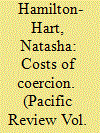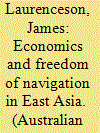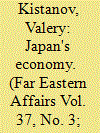|
|
|
Sort Order |
|
|
|
Items / Page
|
|
|
|
|
|
|
| Srl | Item |
| 1 |
ID:
120205


|
|
|
|
|
| Publication |
2013.
|
| Summary/Abstract |
Violent conflict tends to be costly overall, but can, under some conditions, yield net gains for the initiators of violence, thus creating incentives for coercion. This article explores the economic incentives for coercion across three different arenas and types of conflict: international conflict among states, organized political violence within the state, and relatively unorganized domestic conflicts over property rights. Although these conflicts are normally studied in separate scholarly traditions (respectively, international relations, domestic security studies and political economy), drawing from these different traditions can help explain the comparative incidence of coercive force in different conflict arenas by identifying conditions that create incentives for violence. Using cases from Southeast Asia, the article offers an explanation for the empirical pattern of violence in the region being more prevalent currently at the domestic, rather than the international, level and most pervasive in apparently low-level and unorganized forms. At least in part, this pattern is a consequence of the relative stability and consistent protection of what may be thought of as international property rights claims, compared with the greater uncertainty and inconsistency in the enforcement of domestic rights claims. While intuitively paradoxical when viewed through Westphalian lenses, which assume international anarchy and domestic hierarchy, greater contention over domestic rights claims is consistent with the relative asymmetries in coercive capabilities and institutions for dealing with rights claims at the domestic level, compared with the international arena.
|
|
|
|
|
|
|
|
|
|
|
|
|
|
|
|
| 2 |
ID:
157351


|
|
|
|
|
| Summary/Abstract |
Do norms constrain states’ foreign policies even in the face of strong economic incentives to ignore them? Arms exports provide an excellent opportunity to examine this question more closely. They regularly spark fierce political debates on whether to trade goods that buyers might deploy with devastating effects. We use the case of German arms exports to provide an in-depth statistical analysis of the behavior of a major arms exporter that claims to follow high normative standards. In particular, we investigate to what extent domestic, supranational, and international rules and norms shape German decisions about the destination and volume of major conventional weapon deliveries. Using panel data for the period 1953–2013, we employ a Heckman selection model to capture the two-step nature of the decision-making process. We find that German arms export policies often fail to comply with standards that prohibit exports to countries embroiled in military conflicts, civil wars, or with strong human rights violations. Furthermore, we discover, however, that the country fully complied with multilateral arms embargoes after 1990. We conclude that the noneffectiveness of certain rules and norms stems from both the ambiguity of norms and the opacity of decision-making processes.
|
|
|
|
|
|
|
|
|
|
|
|
|
|
|
|
| 3 |
ID:
154807


|
|
|
|
|
| Summary/Abstract |
Public calls for a more aggressive regional response to China’s pressing of its territorial claims in the South China Sea are typically couched in terms of the threat posed to freedom of navigation. Yet this invites an obvious question: If freedom of navigation, a vital interest for nearly every country in the region, is at risk, why has the regional response to China’s actions to date been so limited? This article argues that one compelling explanation lies in the economics of freedom of navigation in East Asia. Put simply, the risks of freedom of navigation being impeded are frequently overstated, and a more sober assessment of these risks can reduce the incentive that countries have to take more dramatic action.
|
|
|
|
|
|
|
|
|
|
|
|
|
|
|
|
| 4 |
ID:
091778


|
|
|
|
|
| Publication |
2009.
|
| Summary/Abstract |
The world financial crisis has struck Japan's economy more heavily than the economies of other countries. In order to emerge from the crisis the Japanese government put an emphasis on the Keynesian methods of regulation, which consist in pumping state financial means into the economy with a view to expanding domestic demand and eliminating disbalance between demand and supply.
|
|
|
|
|
|
|
|
|
|
|
|
|
|
|
|
| 5 |
ID:
193739


|
|
|
|
|
| Summary/Abstract |
We evaluate a political market mechanism for siting nuclear waste repositories to local communities. This mechanism consists of a local referendum and economic incentives offered to the local population. Using a randomized choice experiment, we find that the political market mechanism decreases the Not-In-My-Backyard opposition in the case of nuclear waste.
|
|
|
|
|
|
|
|
|
|
|
|
|
|
|
|
| 6 |
ID:
051630


|
|
|
| 7 |
ID:
171439


|
|
|
|
|
| Summary/Abstract |
The paper discusses the dynamics behind price-based incentives in demand response programmes promoting time shifting of energy consumption in households. Through a comparative analysis of smart energy pilots in Norway, Austria, and Denmark, the study shows that economic incentives under certain conditions influence energy-consuming practices of households but not in ways anticipated by widespread rational conceptualisations within economic, engineering, and policy-making approaches. The paper elaborates the practice-theoretical understanding of financial structures in smart energy interventions and identifies the socio-material configurations causing price to play a role. This informs policymakers and developers of future smart energy interventions. The overall policy recommendation of the paper is that smart energy designers, planners, and policymakers need to consider the complexity of interrelated elements that co-determine the effectiveness of price incentives. Thus, a successful coupling between price incentives and demand response actions can best be realised via a productive mixture of mutually supporting elements (engagements, devices, and competences). In addition, the paper provides specific recommendations related to the design of effective and workable price schemes that fit into the everyday lives of households.
|
|
|
|
|
|
|
|
|
|
|
|
|
|
|
|
|
|
|
|
|